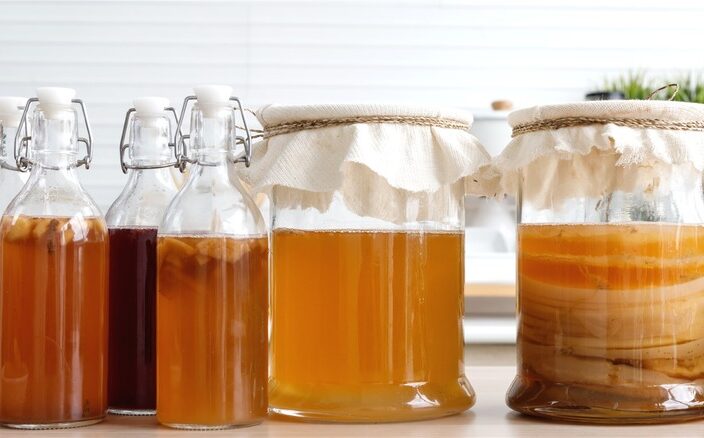8 Super Effective Fermented Drinks for Gut Health (From Across The Globe)
A few years ago, I began noticing something wasn’t quite right with my digestion. My stomach felt bloated more often than not, I had low energy, and a general feeling of discomfort lingered. I tried all the usual fixes—probiotics in pill form, adjusting my diet—but nothing seemed to click. Then, one evening over dinner, a friend shared their secret weapon for gut health: fermented drinks.
That conversation marked the beginning of a journey that took me from sipping kombucha in my kitchen to exploring kefir, kvass, and other fermented marvels from around the world. What I discovered was astonishing—not only do these drinks taste amazing, but they also work wonders for your gut health.
Today, I’m sharing 8 super effective fermented drinks for gut health, along with their fascinating origins and how they can transform your digestion. Let’s take a flavorful journey across the globe!
What Makes Fermented Drinks So Good for Your Gut?
Fermentation is like a magic trick performed by nature. When food or drink ferments, beneficial bacteria and yeast convert sugars into compounds like lactic acid or alcohol. This process not only preserves the beverage but also creates a powerhouse of probiotics, vitamins, and enzymes that are incredibly nourishing for your gut.
Probiotics—those friendly bacteria found in fermented drinks—help restore balance to your gut microbiome. They strengthen digestion, boost immunity, and even improve mental clarity by influencing the gut-brain connection.
1. Kombucha (China)
Kombucha is a fizzy, tangy tea that has captured hearts (and stomachs) worldwide. Made by fermenting sweet tea with a symbiotic culture of bacteria and yeast (SCOBY), kombucha is loaded with probiotics and antioxidants.
Why It’s Good for Your Gut:
Kombucha supports digestion, detoxifies the liver, and introduces a variety of good bacteria to your microbiome.
Personal Experience:
I vividly remember my first sip of kombucha. The tangy sweetness was unlike anything I’d tasted before, and within a week of drinking it daily, I noticed less bloating and a calmer stomach. My favorite flavor? Ginger-lemon—it feels like a tonic for the soul.
2. Kefir (Caucasus Mountains)
Kefir is like yogurt in a glass—thick, creamy, and packed with probiotics. Traditionally made from cow or goat milk fermented with kefir grains, this drink has been a staple in Eastern Europe and Central Asia for centuries.
Why It’s Good for Your Gut:
Kefir contains up to 61 different strains of probiotics, making it a powerhouse for gut diversity. It’s also rich in calcium, protein, and B vitamins.
Personal Experience:
When I started drinking kefir, I was skeptical about the taste. But after blending it with a handful of berries and a drizzle of honey, it quickly became my go-to breakfast. The difference in my digestion was remarkable—I felt lighter and more energized.
3. Lassi (India)
Lassi, a traditional Indian yogurt-based drink, is both delicious and gut-friendly. It’s typically flavored with spices like cumin or cardamom and can be sweet or savory.
Why It’s Good for Your Gut:
Lassi aids digestion by soothing the stomach and promoting the growth of healthy gut bacteria. Its cooling properties make it especially beneficial after a spicy meal.
Personal Experience:
My first encounter with lassi was at an Indian restaurant, and it was love at first sip. The creamy texture paired with a hint of cumin felt like a digestive reset button, especially after a heavy curry.
4. Kvass (Eastern Europe)
Kvass is a traditional Slavic drink made from fermented rye bread. With a slightly tangy, malty flavor, it’s a unique option for those seeking gut-friendly beverages.
Why It’s Good for Your Gut:
Kvass is rich in probiotics, B vitamins, and minerals, all of which support a healthy microbiome.
Personal Experience:
When I first tried kvass, I wasn’t sure what to expect. Its earthy, tangy flavor grew on me quickly, and I loved knowing I was sipping on centuries of tradition. It became a great alternative to soda during meals.
5. Tepache (Mexico)
Tepache is a sweet and tangy fermented pineapple drink with roots in Mexican street food culture. It’s made by fermenting pineapple rinds with sugar and spices like cinnamon.
Why It’s Good for Your Gut:
Tepache is a probiotic-rich drink that also contains bromelain, an enzyme found in pineapple that aids digestion and reduces inflammation.
Personal Experience:
I started making tepache at home during the summer, and it quickly became a family favorite. The tropical flavors are a refreshing treat, and my gut feels great after a glass.
6. Sima (Finland)
Sima is a traditional Finnish drink often enjoyed during May Day celebrations. Made by fermenting water, lemon, sugar, and yeast, it’s lightly fizzy and subtly sweet.
Why It’s Good for Your Gut:
While not as rich in probiotics as other drinks, sima still supports gut health through its fermentation process.
Personal Experience:
A Finnish friend introduced me to sima, and I was hooked after the first sip. It’s like a cross between lemonade and champagne—perfect for a celebratory toast and gentle on the stomach.
7. Rejuvelac (USA, Inspired by Eastern Europe)
Rejuvelac is a fermented grain drink made from sprouted grains like wheat, rye, or quinoa. It’s tangy and slightly fizzy, often used as a base for vegan cheeses.
Why It’s Good for Your Gut:
Rejuvelac is rich in enzymes, vitamins, and probiotics, making it a fantastic choice for digestive health.
Personal Experience:
I started experimenting with rejuvelac when I transitioned to more plant-based meals. It became my secret weapon for better digestion and gut balance after heavier dishes.
8. Ayran (Middle East)
Ayran is a salty, yogurt-based drink popular in Turkey, Iran, and surrounding regions. It’s typically made by mixing yogurt, water, and a pinch of salt.
Why It’s Good for Your Gut:
Ayran helps balance gut flora, aids in hydration, and soothes the digestive tract.
Personal Experience:
The first time I had ayran was on a hot summer day in Istanbul. The cool, tangy drink was incredibly refreshing, and I immediately felt its calming effect on my stomach after a heavy kebab meal.
How to Incorporate Fermented Drinks into Your Routine
- Start Small: Begin with a small serving (4–6 ounces) to let your gut adjust.
- Experiment with Flavors: Try different fermented drinks to find your favorite.
- Pair with Meals: These drinks can complement meals and aid digestion.
Final Thoughts: A Sip Toward Better Gut Health
Fermented drinks aren’t just beverages—they’re a journey into the history, culture, and science of gut health. Each sip carries the wisdom of generations and the power of probiotics to transform your digestion.
For me, embracing fermented drinks was a game-changer. They turned my bloated, sluggish gut into a balanced, thriving ecosystem. If you’re looking to support your digestion and explore new flavors, start with one of these 8 global treasures. Your gut—and your taste buds—will thank you. Cheers to health and happiness!


